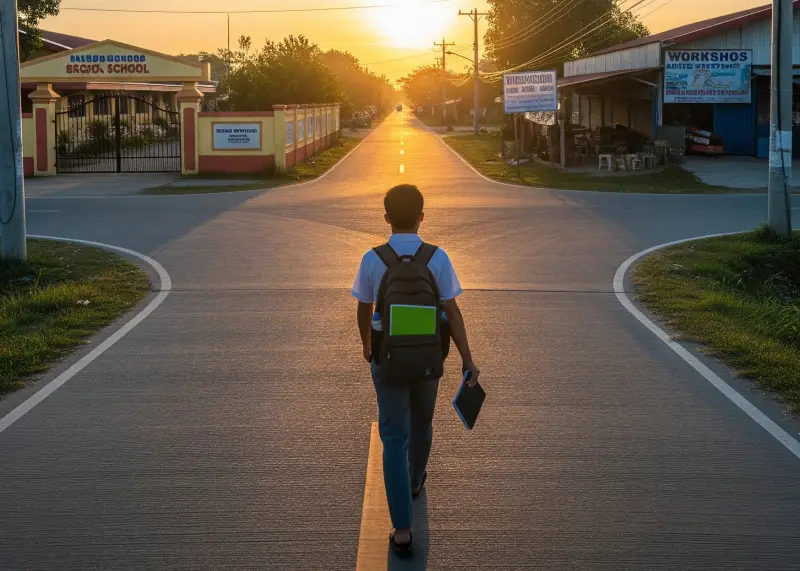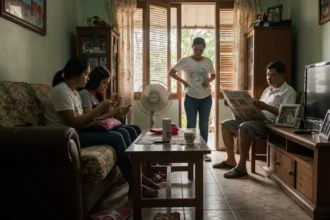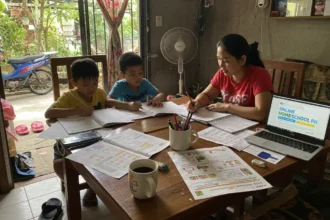💔 A Golden Ticket or a Crushing Debt? The Philippine Dilemma
The image is a powerful one. A young Filipino, dressed in a graduation cap and gown, is smiling proudly. Their parents are crying tears of joy and relief. This is the dream. This is the promise. For a family in a small town in Mindoro, a college diploma is more than a piece of paper. It is a symbol of immense sacrifice. It is a golden ticket to a better life. It is the culmination of years of hard work, sleepless nights, and countless financial struggles. But what if that promise is a lie? What if that golden ticket is a heavy, expensive burden? What if the diploma that was supposed to open doors is now just a costly piece of decoration? This is the heart-wrenching question that is haunting millions of Filipinos: is college still worth it in the Philippines?
- 💔 A Golden Ticket or a Crushing Debt? The Philippine Dilemma
- 💸 The Financial Nightmare: The Crushing Cost of a Diploma
- 😔 The Job Market Betrayal: A Diploma is Not Enough
- 🌱 The New Education: Alternative Paths to Success
- 💔 The Final Verdict: A Personal, Emotional Choice
- 🤔 FAQs about College and Career Paths in the Philippines
- The Final Choice: Your Future is Your Own
- 🧭 References
The drama is real. It is a family’s life savings drained for a four-year degree. It is a student feeling the crushing pressure of utang na loob, an emotional debt to their parents. It is the painful realization that a diploma no longer guarantees a job. The world has changed. The job market has evolved. The rules that our parents and grandparents lived by are no longer applicable. The Filipino family is at a crossroads. They are faced with a difficult and deeply emotional decision. This is not a simple choice. It is a gut-wrenching gamble on a family’s future.

💸 The Financial Nightmare: The Crushing Cost of a Diploma
The most immediate and painful aspect of this debate is financial. The cost of a college education has skyrocketed. It is a crushing weight on the shoulders of Filipino families, especially those in the low-to-middle income bracket. Parents often have to make impossible choices. They have to work multiple jobs. They have to take on loans. They have to send a family member abroad just to cover the tuition fees and other educational expenses. This is a sacrifice that is not made lightly. It is a powerful emotional and financial investment. It is an act of pure, unconditional love.
The weight of this financial burden is immense. It can drain a family’s life savings. It can plunge them into years of debt. The hope of a better life is often accompanied by the stress of paying for it. For a family in the province, a single semester’s tuition can be a significant portion of their annual income. Consequently, the child’s education becomes a communal effort. The entire family, from the parents to the grandparents, is invested. This financial pressure is the first domino to fall in this tragic drama.
💰 Tuition Fees vs. The Future
The cost of tuition is a stark reality. It is a number that can fill a parent with dread. A four-year degree in a good university can cost anywhere from hundreds of thousands to over a million pesos. The tuition fee is just one part of it. There are also books, uniforms, transportation, and daily allowances. This is a massive drain on a family’s finances. It is a sum that many families cannot afford. This forces them to consider cheaper, less reputable schools, or to take on student loans that will follow the family for years. The dream of a good education is often accompanied by the nightmare of paying for it.
💔 The Utang na Loob of Education
The financial sacrifice of the family creates a deep, emotional burden on the student. It is the feeling of utang na loob, or a debt of gratitude. This debt is not a bad thing. It is a powerful part of our culture. However, in this context, it can be a heavy, crushing weight. The student feels an immense pressure to succeed. They feel that they must get a high-paying job. They feel that they must repay their parents’ sacrifice. This pressure can lead to burnout, anxiety, and a deep fear of failure. The diploma, which was supposed to be a source of freedom, becomes a heavy chain.

😔 The Job Market Betrayal: A Diploma is Not Enough
The promise of a diploma is a good job. The reality of the job market in 2025 is a betrayal of that promise. A college diploma, once a guaranteed ticket to a good job, is now just a ticket to an endless line of applicants. The job market has changed. It is no longer a world of traditional jobs. It is a world of skills.
The drama of the modern job hunt is a painful one. A college graduate, full of hope, sends out hundreds of resumes. They get a few interviews. They face a job market that is not just competitive but also demanding. Many companies no longer value a degree. They value experience. They value skills. A recent graduate with a diploma is often competing with someone who has been freelancing for years. They are competing with someone who has a specialized skill. The diploma, which was supposed to be their greatest asset, is now just one of many. This is a new, painful reality.
💼 Experience Over Education: The New Gold
Many of the most in-demand jobs today do not require a college diploma. They require skills. They require experience. A company that is looking for a digital marketer is not just looking for someone with a marketing degree. They are looking for someone who has managed a successful social media campaign. They are looking for someone who knows how to run a Facebook ad. They are looking for a portfolio of work. They are looking for a certificate from a coding bootcamp or an online course. This is the new gold. It is a skill. It is not a degree.
💻 The Rise of the Freelancer and the Digital Nomad
The internet has created a new kind of worker. They are freelancers. They are digital nomads. These workers do not need a diploma. They need a laptop. They need an internet connection. They need a skill. They can earn more than a traditional office worker. They can work for foreign clients and earn in dollars. This is a powerful new alternative. It is a path to financial freedom that does not require four years of college and a mountain of debt. It is a path that many young Filipinos are now choosing.

🌱 The New Education: Alternative Paths to Success
The answer to this dilemma is not to abandon education. It is to rethink it. It is to look for new, more affordable, and more practical paths to success.
The new education is not a four-year, traditional degree. It is a continuous process of learning. It is a process of acquiring new skills. The new education is fast. It is practical. It is affordable. It is a powerful new tool for a generation that is looking for a way out of a broken system. It is a way to get the skills you need for the jobs of tomorrow without the financial burden of a college degree.
🛠️ Vocational Courses: The Tech-Voc Renaissance
Technical-vocational courses are having a renaissance. These courses are short. They are affordable. They are practical. They give students a specific skill that is in high demand.
- Electrician, Welder, Automotive Mechanic: These jobs are always in demand. They pay well. They do not require a college degree.
- Bookkeeping, Digital Animation, Computer Programming: These are modern skills that can be learned in a few months. They lead to high-paying jobs.
🌐 Online Learning: The Global Classroom
The internet has created a global classroom. Students can learn from experts all over the world. They can get a certification from a platform like Coursera or Udemy. These certifications are often more valuable than a college degree in a specific field. They are a powerful new tool. They are a sign that the future of education is not a single path. It is a multitude of paths.

💔 The Final Verdict: A Personal, Emotional Choice
So, is college still worth it in the Philippines? The answer is no longer a simple yes or no. It is a deeply personal and emotional choice. A college education is not a waste. It provides critical thinking skills. It provides a community. It provides a foundation of knowledge. But it is not a guaranteed ticket to success. It is a powerful tool. But it is just one tool among many. The decision must be made with a clear understanding of its financial and emotional costs. The decision must be made with a full understanding of all the alternative paths that are now available. This is a difficult, heartbreaking choice.
This table provides a summary of the pros and cons to consider:
🤔 FAQs about College and Career Paths in the Philippines
Q1: Is college still worth it in the Philippines today? A: College is still worth it for many, but its value is no longer a given. The high cost and competitive job market force students to carefully weigh their options against more practical, skill-based career paths.
Q2: What is the main argument against going to college? A: The main argument against college is the high financial cost and the lack of a job guarantee. Many argue that the money and time could be better spent acquiring specific skills that are in high demand in the job market.
Q3: What are some good alternatives to a college diploma? A: Good alternatives include technical-vocational courses that offer in-demand skills, and online certifications from platforms like Coursera and Udemy, which are often more affordable and flexible.
Q4: How does the concept of utang na loob affect college students? A: The utang na loob of education creates immense pressure on students to succeed. They feel a deep emotional debt to their parents for their sacrifices, which can lead to stress, anxiety, and burnout.
Q5: Is a college diploma still required for high-paying jobs in the Philippines? A: No. Many high-paying jobs, especially in the digital and creative fields, now prioritize a strong portfolio and a specific skill set over a traditional college diploma.
Q6: What is the Tech-Voc Renaissance? A: The Tech-Voc Renaissance refers to the renewed popularity of technical-vocational courses. These courses are becoming a viable alternative to college, as they provide students with specific, in-demand skills in a shorter amount of time.
Q7: Can online certifications replace a college diploma? A: In some fields, yes. For digital skills like coding, data analysis, and marketing, a certification from a reputable online platform is often valued more by employers than a generic college degree.
Q8: How can parents support their children in making a career decision? A: Parents can support their children by having an open conversation. They should encourage their children to explore all their options, including vocational and online courses, and to make a decision based on their passion and skills, not just on tradition.

The Final Choice: Your Future is Your Own
The question is college still worth it in the Philippines is not one to be taken lightly. It is a question that will shape the lives of millions. It is a question that will decide the fate of a family’s financial future. The old promise is gone. A new world of opportunities has emerged. The choice is no longer between a college diploma and nothing at all. It is a choice between a traditional path and a multitude of new, exciting, and affordable paths. The decision is yours. It is your future. It is your life. And it is the most important decision you will ever make.
🧭 References
-
Reddit r/buhaydigital – How important is having a college degree?
-
Forbes – Is College Worth It in 2025?
-
Philstar – Is college essential?
-
DLSU Research Congress – Returns to Education in the Philippines










